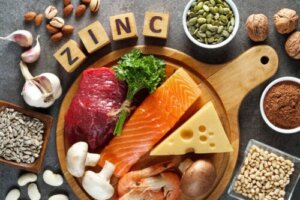Zinc in Child Nutrition: What You Need to Know

Zinc is an essential mineral for the human body. It serves several functions within the body and it’s important to be sure to meet daily requirements. Although it’s not common to suffer from zinc deficiency, such a situation could affect a person’s health, which is why zinc is so important in child nutrition.
Before we begin, we must be clear about the importance of ensuring that the levels of micronutrients in the human body are optimal. They’re found in almost all foods and perform critical functions in the context of human physiology.
The importance of zinc in child nutrition
Children have an immature immune system that’s still developing. Therefore, it’s common for them to become ill when they come into contact with their schoolmates. However, you can minimize this risk through diet by including foods the right foods.

It’s a nutrient that works synergistically with vitamin C, which is also necessary to protect the body against attacks by viruses and bacteria. If the intake of both substances is optimal, the risk of getting sick reduces significantly. At the same time, the duration of viral processes is also shorter.
Zinc for the treatment of intestinal problems
One of the frequent ailments in children, which is even more dangerous in infants, is diarrhea. This problem can lead to dehydration, which often results in hospitalization. The reasons for diarrhea can be diverse, but it’s a condition that you can prevent and manage in the right way.
According to research in The Cochrane Database of Systematic Reviews, zinc supplementation or maintaining adequate levels of the nutrient can put a stop to diarrhea and prevent complications. Obviously, the causative element will require study, but the nutrient is able to offer simpler management of the problem.
It’s important, therefore, to ensure the presence of zinc in the diet to reduce the risk of developing gastrointestinal disorders that can put the child’s health at risk. Also, a probiotic supplement can help those who are particularly sensitive.
Where to find zinc?
Supplementation is one possible way to obtain zinc, but not the one that specialists prefer. Ideally, parents should introduce foods with a high content of this nutrient to ensure optimal levels.
As a general rule, meats have high concentrations of zinc. Both red and white meats are a good source of the mineral. The same goes for seafood and eggs. Besides, they provide iron, another fundamental element to assuring proper energy levels in children.
Within the section of zinc sources of vegetable origin, it’s possible to find significant quantities of zinc in seeds, in some nuts such as walnuts, in wheat germ, and in certain legumes, such as beans.
In this sense, it’s a good idea to consider a diet that’s as varied as possible, since there are many sources of zinc that children can consume. By broadening the spectrum of foods they eat, it’ll be very difficult for a zinc deficit to occur. However, supplementation with zinc in certain circumstances can be beneficial.

Zinc, an essential mineral in child nutrition
As mentioned above, zinc is important in children to reduce the incidence of infectious diseases. This way, the immune system will develop properly and the body will become less vulnerable to infections. In the medium term, it’s a great gain in health.
In addition, it can be used as a supplement in cases of diarrhea in order to stop the problem and prevent a progression that can lead to dehydration. These cases usually end up with hospital admission, negatively affecting the functioning of the child’s body. Prevention is best.
Finally, remember that zinc deficiency, in the context of a varied diet, is rare. Supplementation with the nutrient isn’t usually necessary if children consume foods of animal origin on a regular basis.
Zinc is an essential mineral for the human body. It serves several functions within the body and it’s important to be sure to meet daily requirements. Although it’s not common to suffer from zinc deficiency, such a situation could affect a person’s health, which is why zinc is so important in child nutrition.
Before we begin, we must be clear about the importance of ensuring that the levels of micronutrients in the human body are optimal. They’re found in almost all foods and perform critical functions in the context of human physiology.
The importance of zinc in child nutrition
Children have an immature immune system that’s still developing. Therefore, it’s common for them to become ill when they come into contact with their schoolmates. However, you can minimize this risk through diet by including foods the right foods.

It’s a nutrient that works synergistically with vitamin C, which is also necessary to protect the body against attacks by viruses and bacteria. If the intake of both substances is optimal, the risk of getting sick reduces significantly. At the same time, the duration of viral processes is also shorter.
Zinc for the treatment of intestinal problems
One of the frequent ailments in children, which is even more dangerous in infants, is diarrhea. This problem can lead to dehydration, which often results in hospitalization. The reasons for diarrhea can be diverse, but it’s a condition that you can prevent and manage in the right way.
According to research in The Cochrane Database of Systematic Reviews, zinc supplementation or maintaining adequate levels of the nutrient can put a stop to diarrhea and prevent complications. Obviously, the causative element will require study, but the nutrient is able to offer simpler management of the problem.
It’s important, therefore, to ensure the presence of zinc in the diet to reduce the risk of developing gastrointestinal disorders that can put the child’s health at risk. Also, a probiotic supplement can help those who are particularly sensitive.
Where to find zinc?
Supplementation is one possible way to obtain zinc, but not the one that specialists prefer. Ideally, parents should introduce foods with a high content of this nutrient to ensure optimal levels.
As a general rule, meats have high concentrations of zinc. Both red and white meats are a good source of the mineral. The same goes for seafood and eggs. Besides, they provide iron, another fundamental element to assuring proper energy levels in children.
Within the section of zinc sources of vegetable origin, it’s possible to find significant quantities of zinc in seeds, in some nuts such as walnuts, in wheat germ, and in certain legumes, such as beans.
In this sense, it’s a good idea to consider a diet that’s as varied as possible, since there are many sources of zinc that children can consume. By broadening the spectrum of foods they eat, it’ll be very difficult for a zinc deficit to occur. However, supplementation with zinc in certain circumstances can be beneficial.

Zinc, an essential mineral in child nutrition
As mentioned above, zinc is important in children to reduce the incidence of infectious diseases. This way, the immune system will develop properly and the body will become less vulnerable to infections. In the medium term, it’s a great gain in health.
In addition, it can be used as a supplement in cases of diarrhea in order to stop the problem and prevent a progression that can lead to dehydration. These cases usually end up with hospital admission, negatively affecting the functioning of the child’s body. Prevention is best.
Finally, remember that zinc deficiency, in the context of a varied diet, is rare. Supplementation with the nutrient isn’t usually necessary if children consume foods of animal origin on a regular basis.
All cited sources were thoroughly reviewed by our team to ensure their quality, reliability, currency, and validity. The bibliography of this article was considered reliable and of academic or scientific accuracy.
- Wessels I, Maywald M, Rink L. Zinc as a Gatekeeper of Immune Function. Nutrients. 2017 Nov 25;9(12):1286. doi: 10.3390/nu9121286. PMID: 29186856; PMCID: PMC5748737.
- Lazzerini M, Wanzira H. Oral zinc for treating diarrhoea in children. Cochrane Database Syst Rev. 2016 Dec 20;12(12):CD005436. doi: 10.1002/14651858.CD005436.pub5. PMID: 27996088; PMCID: PMC5450879.
This text is provided for informational purposes only and does not replace consultation with a professional. If in doubt, consult your specialist.








